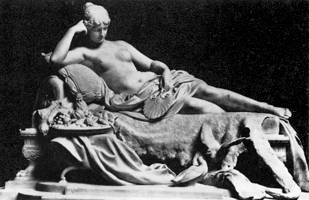
Aspasia was the mistress of Pericles, the leader of Athens during the Classical Age. She was a hetaira, a trained and paid companion who accompanied upper-class men to the symposiums. As the mistress of Pericles, she suffered attacks from his political en emies. Aspasia and Pericles had one son, who was later legitimised . After the death of Pericles she married Lysicles a man of humble birth who became a successful politician in Athens through her assistance. Information about Aspasia is difficult to locate in the ancient sources. Most famous facts of Aspasia's life we can find in Diodoros the Athenian, Plutarch. It was probably in Ionia, before she left for Athens, that Aspasia was educated. Women in that part of the Greek world were generally given more of an education than women in Athens. Arriving in Athens as a free immigr ant around 445 B.C., Aspasia worked as a hetaira. As the paid companion of aristocratic men Aspasia attended symposiums, drink ing parties combined with political and philosophical discourse. At the symposiums she met the most influential and powerful men in Athens, including Pericles. Sometime around 445 B.C. Aspasia began to live with Pericles, who at that time was the leader o f Athens. In respect to Aspasia and Pericles Plutarch states, that Pericles valued Aspasia's intelligence and political insight, but he emphasises that Pericles' feelings for her were primarily erotic. Plutarch describes the relationship between Aspasia and Pericles as a very happy one. He writes that Aspasia was trying to emulate Thargelia, a famous Milesian courtesan whose lovers were the most powerful men in Greece. Plutarch blames Aspasia for Pericles' decision to start the war against Samos, a wealthy and powerful member of the empire. The Samians refused to submit the conflict to Athenian arbitration. Supposedly, Aspasia pressured Pericles to take military action against Sam os. As the mistress of Pericles' household and hostess to his friends and supporters, Aspasia participated in discussions revolving around politics and philosophy with the leading men of the Athenian Empire. Freed from the social restraints that tied married women to their homes and restricted their behaviour, Aspasia was able to participate more freely in public life. \par Strong evidence that Aspasia's role in Athens went beyond that of mistress to Pericles is given by Plato in the Menexenus. In this dialogue, Plato has Socrates recite a funeral oration composed by Aspasia that glorifies the Athenians and their history. By satirising a speech \ldblquote written\rdblquote by Aspasia, Plato acknowledges her role as a leader of rhetoric in the Greek Classical Age. \par Plutarch states that Aspasia herself operated a house of courtesans and trained young women in the necessary skills Aspasia's hetairai would have had as patrons the elite men of Athens, especially the supporters of Pericles. \par Around 438 B.C. Pericles' political enemies began attacking those close to him in court and eventually brought charges against Pericles himself. Soon Aspasia became a target. \par The plague in Athens in 430 B.C. killed both of Pericles' sons by his first wife. The people of Athens agreed to Pericles' request. His son was legitimised and made a citizen of Athens. In 429 B.C. Pericles died from the plague. A year later Aspasia became involved with a sheep seller named Lysicles in another unofficial marriage. There is no information about Aspasia's life after this point.

